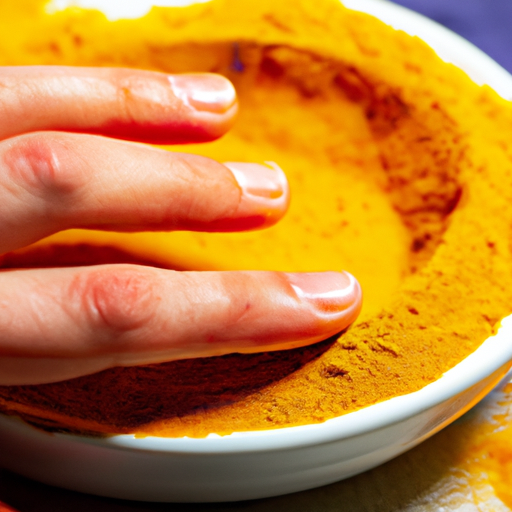You may be familiar with the popular spice that has become a health trend – turmeric. You may have even experimented with different ways of using it, such as making turmeric tea. However, it’s important to note that excessive consumption of turmeric can have negative effects on your health.
In this article, we’ll dive into the question of whether you can drink too much turmeric tea and explore the potential risks and benefits of this popular beverage.
Turmeric has been used for centuries in traditional medicine for its anti-inflammatory and antioxidant properties, and recent scientific research has supported its potential health benefits. However, as with any supplement or food, it’s important to understand the potential risks of overconsumption.
So, let’s take a closer look at the health benefits of turmeric tea and how much is safe to drink.
Key Takeaways
- Exceeding the recommended daily intake of turmeric tea can lead to potential side effects such as upset stomach, nausea, and diarrhea.
- Pregnant women should avoid drinking turmeric tea due to potential effects on the uterus.
- Individuals on blood-thinning medications or with a history of gallstones should exercise caution when consuming turmeric tea.
- Measuring the right amount of turmeric powder and water is crucial to avoid overconsumption.
The Health Benefits of Turmeric Tea
You’ll love how turmeric tea can boost your health with its numerous benefits. Not only is it a delicious and comforting drink, but it also has impressive health benefits.
Turmeric contains a powerful antioxidant called curcumin that has anti-inflammatory properties which may help reduce the risk of chronic diseases such as heart disease, cancer, and Alzheimer’s. Drinking turmeric tea regularly may help improve your overall health and wellbeing.
In addition to its potential disease-fighting properties, turmeric tea also has benefits for your skin. The curcumin found in turmeric may help improve skin elasticity and reduce the appearance of fine lines and wrinkles. It may also help reduce inflammation and redness associated with skin conditions such as eczema and psoriasis.
Try making your own turmeric tea recipe at home by combining ground turmeric with hot water, honey, and a squeeze of lemon. Understanding curcumin and its effects on the body, it’s important to note that while turmeric tea has many potential health benefits, it’s possible to consume too much of it.
Understanding Curcumin and Its Effects on the Body
Curcumin, the main active ingredient in turmeric, has anti-inflammatory properties that can potentially reduce the risk of chronic diseases. However, curcumin has low bioavailability, making it hard for the body to absorb. This makes achieving therapeutic doses of curcumin through turmeric tea alone difficult.
To increase absorption, consider taking supplements or combining turmeric with black pepper. Piperine, a compound found in black pepper, can enhance the bioavailability of curcumin by up to 2000%. Turmeric tea can still provide health benefits, but supplements and other forms of curcumin may be more effective for achieving therapeutic doses.
So, how much turmeric tea is safe to drink? Let’s explore this in the next section.
How Much Turmeric Tea is Safe to Drink?
When it comes to drinking turmeric tea, you may be wondering how much is safe to consume on a daily basis. The recommended daily intake of turmeric is generally around 500-2,000 milligrams per day, which equates to about 1-2 teaspoons of turmeric powder.
However, there are also several factors that can affect how much turmeric tea you can safely drink, such as your age, overall health, and any medications you may be taking.
Recommended daily intake
The recommended daily intake of turmeric tea varies depending on factors such as age, health status, and overall diet. For adults, the recommended daily intake of turmeric tea is 400-600mg of curcumin, which is the active ingredient in turmeric. However, it’s important to note that exceeding this recommended daily intake can lead to potential side effects such as upset stomach, nausea, and diarrhea.
Factors that can affect safe consumption of turmeric tea include individual tolerance, pre-existing medical conditions, and medication interactions. For example, if you have a history of gallbladder problems or are taking blood thinners, it’s important to speak with your healthcare provider before consuming turmeric tea. It’s also recommended to start with a small amount and gradually increase intake to assess tolerance and avoid any potential adverse effects.
Factors that can affect safe consumption
It’s important to be aware that individual tolerance, pre-existing medical conditions, and medication interactions can affect safe consumption of turmeric tea. Factors affecting absorption can include gastrointestinal issues or low levels of certain enzymes. Additionally, certain medications such as blood thinners, stomach acid reducers, and diabetes medications can interact with turmeric, leading to potential side effects or changes in effectiveness.
To ensure safe consumption, it’s recommended to start with a small amount of turmeric tea and gradually increase while monitoring for any adverse effects. It’s also important to speak with a healthcare provider if you have any pre-existing medical conditions or are taking medications to ensure there are no potential drug interactions.
By being mindful of these factors, you can safely incorporate turmeric tea into your diet.
In the next section, we will discuss the potential risks of consuming too much turmeric tea.
Potential Risks of Consuming Too Much Turmeric Tea
If you consume too much turmeric tea, you may experience some potential risks. These risks include upset stomach, diarrhea, dizziness, and nausea. These side effects may be due to the high concentration of curcumin, the active ingredient in turmeric. Curcumin can be irritating to the digestive system. It’s important to be mindful of how much turmeric tea you’re drinking to avoid these uncomfortable symptoms.
Upset stomach
Hey, you might want to take it easy on the turmeric tea if your stomach is feeling a little off. While turmeric tea is generally considered safe to consume, it can cause digestive issues for some people.
Consuming too much turmeric tea may lead to an upset stomach, especially if you have a sensitivity to spicy or acidic foods. Turmeric tea contains curcumin, which has been shown to have anti-inflammatory properties, but it can also stimulate the production of stomach acid. This may lead to heartburn, indigestion, or nausea.
If you’re experiencing digestive issues after drinking turmeric tea, it may be a good idea to reduce your intake or stop drinking it altogether. Now, let’s talk about another potential side effect of consuming too much turmeric tea – diarrhea.
Diarrhea
Excess consumption of turmeric tea can lead to diarrhea, so it’s important to monitor your intake and listen to your body’s reactions. Turmeric tea contains a compound called curcumin that has anti-inflammatory properties and aids in digestion. However, consuming too much of it can cause an upset stomach and diarrhea.
It’s essential to maintain hydration while consuming turmeric tea as it can cause dehydration due to its diuretic properties. Drinking plenty of water and fluids along with turmeric tea can help prevent diarrhea and maintain healthy digestion. It’s always best to start with a small amount and gradually increase the intake of turmeric tea to avoid any digestive issues.
Moving on to the subsequent section about dizziness, it’s crucial to note that consuming turmeric tea in moderation and maintaining healthy hydration levels can help prevent dizziness and other adverse effects.
Dizziness
Managing dizziness can be a concern when consuming turmeric tea, so it’s important to maintain a steady balance and stay grounded while enjoying its health benefits. Turmeric tea may cause dizziness in those who consume it in large quantities or on an empty stomach. To prevent dizziness, it’s recommended to drink turmeric tea in moderation, especially if you’re new to consuming it.
Managing side effects of turmeric tea can be achieved by drinking it with other foods or beverages, such as milk or honey. Additionally, it’s important to stay hydrated and avoid consuming turmeric tea on an empty stomach. If you experience dizziness after consuming turmeric tea, it’s recommended to sit down, breathe deeply, and avoid sudden movements until the dizziness passes.
With proper management and moderation, turmeric tea can provide a range of health benefits without causing significant side effects.
Moving on to the next subtopic, let’s discuss how to prevent nausea when consuming turmeric tea.
Nausea
Feeling queasy after sipping on turmeric tea can put a damper on its potential health benefits, but fear not – there are ways to prevent nausea when consuming this golden elixir.
Here are some natural remedies for preventing nausea:
- Ginger: Adding a slice of fresh ginger to your turmeric tea can help calm your stomach and prevent nausea.
- Peppermint: Sipping on peppermint tea before or after drinking turmeric tea can also help soothe an upset stomach.
- Chamomile: Drinking chamomile tea alongside your turmeric tea can help ease nausea and promote relaxation.
Incorporating these natural remedies into your routine can help prevent any unpleasant side effects when drinking turmeric tea.
Now, let’s explore who should avoid drinking turmeric tea.
Who Should Avoid Drinking Turmeric Tea?
If you are pregnant, you should avoid drinking turmeric tea due to its potential effects on the uterus. Additionally, individuals who are on blood-thinning medications or have a history of gallstones should also exercise caution when consuming turmeric tea. This is because turmeric can increase the risk of bleeding and exacerbate gallbladder problems.
To further understand who should avoid or limit their consumption of turmeric tea, refer to the following table:
| Who should avoid or limit turmeric tea? | Reason |
|---|---|
| Pregnant women | Potential effects on the uterus |
| Individuals on blood-thinning medications | Increased risk of bleeding |
| Individuals with a history of gallstones | Can exacerbate gallbladder problems |
| Those with iron deficiency | Turmeric can interfere with iron absorption |
It is important to note that while turmeric tea has numerous health benefits, excessive consumption can lead to adverse effects. Therefore, it is essential to practice moderation and consult with a healthcare provider before incorporating turmeric tea into your daily routine. In the next section, we will discuss strategies for avoiding overconsumption of turmeric tea.
How to Avoid Overconsumption of Turmeric Tea
To avoid overconsumption of turmeric tea, you need to measure the right amount of turmeric powder or grated turmeric root. You should also consider combining turmeric tea with other ingredients, such as ginger, lemon, or honey, to enhance its flavor and health benefits.
Lastly, it’s important to listen to your body and stop drinking turmeric tea if you experience any negative side effects.
Measuring the right amount
When consuming turmeric tea, it’s recommended to limit intake to no more than three cups per day. Excessive consumption may lead to digestive issues. To ensure measuring accuracy, use a kitchen scale to weigh the turmeric powder and water ratio. The standard measurement for turmeric tea is one teaspoon of turmeric powder per eight ounces of water.
Brewing techniques can also affect the potency of the tea. Boiling the tea for too long or at too high a temperature may reduce the effectiveness of its anti-inflammatory properties. It’s recommended to bring the water to a boil, then reduce the heat to low and simmer for 10-15 minutes. Strain the tea before drinking to remove any clumps or residue.
When it comes to combining turmeric tea with other ingredients, there are several options to enhance its flavor and health benefits.
Combining turmeric tea with other ingredients
Get creative with your turmeric tea by adding ingredients like ginger, honey, lemon, or cinnamon to enhance its flavor and health benefits. Turmeric tea recipes can be easily customized to suit your taste preferences and health goals.
For instance, if you’re looking to shed some pounds, you can add a pinch of black pepper to your turmeric tea to boost its bioavailability and aid in weight loss. Ginger and lemon can help soothe an upset stomach, while honey can provide a natural sweetener and antimicrobial benefits. Cinnamon, on the other hand, can help regulate blood sugar levels and reduce inflammation.
Turmeric tea and weight loss go hand in hand, but it’s important to remember that moderation is key. While turmeric tea has numerous health benefits, too much of it can cause gastrointestinal discomfort and interfere with the absorption of certain medications. Therefore, it’s essential to listen to your body and consume turmeric tea in moderation.
In the next section, we’ll discuss how to pay attention to your body’s signals to avoid overconsumption.
Listening to your body
By listening to the signals your body sends, you can avoid the discomfort and potential negative effects that may arise from overindulging in turmeric tea. While turmeric tea offers many health benefits, it’s important to pay attention to how your body reacts to it. For some individuals, consuming large amounts of turmeric tea may cause digestive discomfort, such as bloating or diarrhea.
Self-awareness is key when it comes to consuming turmeric tea. Start by drinking small amounts and gradually increasing your intake over time to see how your body responds. If you experience any discomfort, reduce your intake or take a break from drinking turmeric tea.
Pay attention to how you feel and be mindful of any changes in your body. By doing so, you can enjoy the benefits of turmeric tea without any negative side effects.
Listening to your body and being self-aware are important when it comes to consuming turmeric tea. By doing so, you can avoid any discomfort or potential negative effects that may arise from overindulging.
In the next section, we’ll discuss alternative ways to enjoy the benefits of turmeric.
Alternative Ways to Enjoy the Benefits of Turmeric
There are a variety of ways to reap the benefits of turmeric beyond drinking it as tea. One popular option is making a turmeric latte, which involves blending coconut milk, turmeric, cinnamon, and other spices together for a warm, comforting drink.
Additionally, turmeric supplements are available in capsule form for those who prefer a more convenient option. Another way to incorporate turmeric into your diet is by adding it to soups, smoothies, or even as a spice rub on meats. The possibilities are endless when it comes to using this versatile spice in your cooking.
However, it’s important to keep in mind that while turmeric has many potential health benefits, it’s always best to consult with a healthcare professional before making any major changes to your diet or supplement routine. By speaking with a qualified healthcare provider, you can ensure that you’re using turmeric in a way that’s safe and effective for your individual needs.
As with any dietary supplement or change in your diet, it’s important to approach it with caution and do your research before diving in. Your healthcare provider can also help you monitor any potential side effects or interactions with other medications or supplements you may be taking.
The Importance of Consulting with a Healthcare Professional
Before diving into any major changes in your diet or supplement routine, it’s always best to consult with a healthcare professional to ensure that you’re not biting off more than you can chew. This is especially important when it comes to incorporating turmeric tea into your daily routine.
While turmeric tea has many potential benefits, it can also have negative effects if consumed in excess or if you have certain health conditions. Here are some consultation benefits to keep in mind when considering incorporating turmeric tea into your routine:
- A healthcare professional can assess whether turmeric tea is safe and appropriate for you based on your medical history and current medications.
- They can also advise on the appropriate dosage and frequency of consumption to avoid any negative effects.
- A healthcare professional can monitor any potential side effects or interactions with other medications or supplements.
- Consulting with a healthcare professional can also ensure that other lifestyle changes, such as adding turmeric tea to your routine, are done in conjunction with other evidence-based practices to optimize your overall health.
As you can see, consulting with a healthcare professional can provide valuable healthcare guidance when incorporating turmeric tea into your routine. By doing so, you can ensure that you’re safely and effectively reaping the potential benefits of this powerful herb.
In the next section, we will provide additional resources and further reading to help you learn more about turmeric tea and its potential benefits.
Additional Resources and Further Reading
To learn more about the potential benefits of turmeric tea and how to safely incorporate it into your routine, check out these additional resources and further reading options. There are different varieties of turmeric tea available in the market, each having its own unique blend of ingredients and flavors. Some of the popular options include ginger-turmeric tea, turmeric-milk tea, turmeric-lemon tea, and more. You can choose the one that suits your taste and preferences.
Brewing techniques also play an important role in making a delicious and healthy cup of turmeric tea. You can use fresh or dried turmeric root, depending on the availability and convenience. Boil the water, add the turmeric root or powder, and let it simmer for a few minutes. You can also add other ingredients like ginger, honey, lemon, and black pepper to enhance the taste and health benefits of the tea. Experiment with different brewing techniques to find the one that works best for you.
Frequently Asked Questions
What are some common brands of turmeric tea?
Did you know that turmeric tea can provide numerous health benefits, including reducing inflammation and improving brain function? Some popular brands include Yogi and Traditional Medicinals, which offer various flavors like ginger and lemongrass.
How long does it take for turmeric tea to take effect on the body?
Turmeric tea benefits can take effect within 30 minutes to an hour. Dosage and factors affecting turmeric tea absorption, such as adding black pepper or fat, can impact effectiveness. Consult with a healthcare professional before consuming excessive amounts.
What is the recommended age for drinking turmeric tea?
Turmeric tea is generally safe for all ages. However, it’s recommended for adults due to its health benefits. Stick to the recommended turmeric dosage as supplements may cause side effects.
Can turmeric tea be used as a replacement for medication?
While turmeric tea benefits are known to help with inflammation and digestion, it’s important to consult a healthcare provider before using it as a replacement for medication. Turmeric tea side effects include stomach upset and interactions with certain medications.
Is it safe to drink turmeric tea while pregnant or breastfeeding?
If you’re pregnant or breastfeeding, it’s important to be cautious about consuming turmeric tea. While small amounts are likely safe, excessive intake may be harmful. Consult with your healthcare provider for pregnancy safety and breastfeeding concerns.
Conclusion
Congratulations! Now you know all about the benefits and potential risks of drinking turmeric tea. Remember, moderation is key! Too much of anything can be harmful.
So, if you’re a big fan of turmeric tea, make sure to limit your intake and consult your healthcare professional before making it a part of your daily routine. But don’t worry, there are plenty of other ways to enjoy the benefits of turmeric.
You can add it to your meals, take supplements, or even use it topically. Whatever method you choose, remember to always do your research and consult with a healthcare professional before making any changes to your diet or lifestyle.
Keep sipping on that turmeric tea, but don’t forget to stay informed and safe!










